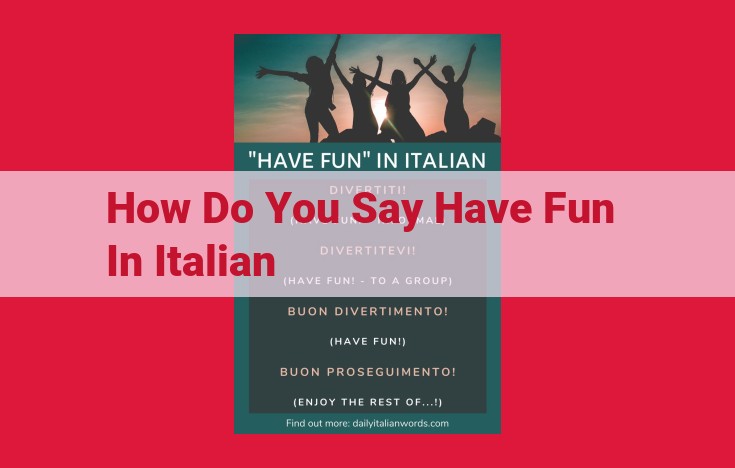To express “have fun” in Italian, the most common phrase is “divertiti”, which is the second person singular imperative form of the verb “divertirsi”. Other phrases used for this purpose include “passa una buona giornata” (have a nice day) or “goditi il momento” (enjoy the moment).
Phrases to Express “Have Fun” in Italian: A Guide to Joyful Greetings
Dive into the Italian Language of Merriment
When exploring the vibrant streets of Italy, immerse yourself in the local language and its playful expressions of joy. The Italian language is brimming with phrases that convey wishes of fun and enjoyment, each carrying a unique charm and nuance.
Common Phrases for Wishing Enjoyment
- Divertiti!: This is the most common phrase used to wish someone a good time. It translates to “have fun” or “enjoy yourself.”
- Buon divertimento!: The addition of “buon” (good) adds an extra layer of emphasis, meaning “have a great time.”
- Ti auguro tanto divertimento!: This longer phrase means “I wish you lots of fun.” It’s a more formal way of expressing your well wishes.
- Passa una bella giornata!: Use this phrase to wish someone a pleasant day full of fun activities.
- Ti auguro una serata piacevole!: For evening gatherings, convey your wishes for a delightful and enjoyable time with this phrase.
Verbs Related to Amusement in Italian
When embarking on a linguistic adventure in Italy, it’s essential to master the vocabulary surrounding the joyous experience of having fun. Let’s explore some key verbs that will ignite your conversations about amusement and laughter.
Divertirsi
At the heart of Italian merriments lies the verb divertirsi, meaning “to have fun” or “to amuse oneself.” Imagine a group of friends gathered, sharing laughter and smiles; divertirsi perfectly captures the essence of their playful camaraderie.
Ridere
The infectious sound of laughter is conveyed through the verb ridere. Whether it’s a gentle chuckle or a roaring guffaw, ridere encompasses the full spectrum of amusement. From the shared humor of a joke to the sheer joy of a child at play, ridere adds a lighthearted touch to any situation.
Scherzare
When the mood calls for playful banter and lighthearted teasing, scherzare comes into its own. This verb signifies the act of “joking around” or “fooling around.” It’s the language of friends and family, creating an atmosphere where the lines between seriousness and laughter blur.
Enrich your Italian vocabulary with these essential verbs and you’ll be ready to navigate the vibrant tapestry of Italian amusement, where fun and laughter are always around the corner.
Nouns for Fun and Enjoyment in Italian
When expressing joy and amusement in Italian, don’t forget the nouns that capture the essence of these emotions.
One of the most common nouns for “fun” is divertimento. It refers to a pleasurable activity or pastime that brings enjoyment and entertainment. For example, you might say: “Il divertimento in famiglia è sempre il migliore” (Family time is always the most fun).
Another essential noun is piacere , which encompasses a broader range of enjoyable experiences, including both personal enjoyment and satisfaction. It can be used in many contexts, such as: “Il piacere di stare con te è immenso” (The pleasure of being with you is immense).
For more specific aspects of fun, you have gioia (joy), felicità (happiness), and allegria (cheerfulness). These nouns convey a sense of elation and contentment. For instance, you could say: “La gioia di vivere è contagiosa” (The joy of living is contagious).
Adjectives for a Joyful Atmosphere: Painting a Vibrant Canvas of Merriment
When we seek to describe the essence of fun, we turn to adjectives that evoke a symphony of laughter, joy, and lightheartedness. In the Italian language, a rich tapestry of such adjectives awaits our exploration, promising to paint a vivid canvas of merriments.
Among the most quintessential adjectives for a joyful atmosphere is divertente (entertaining), capturing the capacity of something to elicit laughter and amusement. Its playful connotation transports us to an enchanting realm where laughter dances freely and the spirit soars.
Another adjective that dances upon the tongue is giocoso (playful), summoning images of mischievous smiles and childlike abandon. It paints a picture of carefree moments, where the boundaries of inhibitions dissolve and joy takes flight.
Lastly, we cannot overlook the charming scherzoso (witty), which weaves a tapestry of clever banter and humorous remarks. It’s an adjective that sparks an undeniable connection, drawing us into a world of laughter-filled exchanges and shared moments of mirth.
Incorporating these adjectives into our vocabulary allows us to weave a symphony of words that celebrates the joy that surrounds us. They serve as brushstrokes, painting a vivid canvas where the vibrant hues of happiness and laughter dance in perfect harmony.
